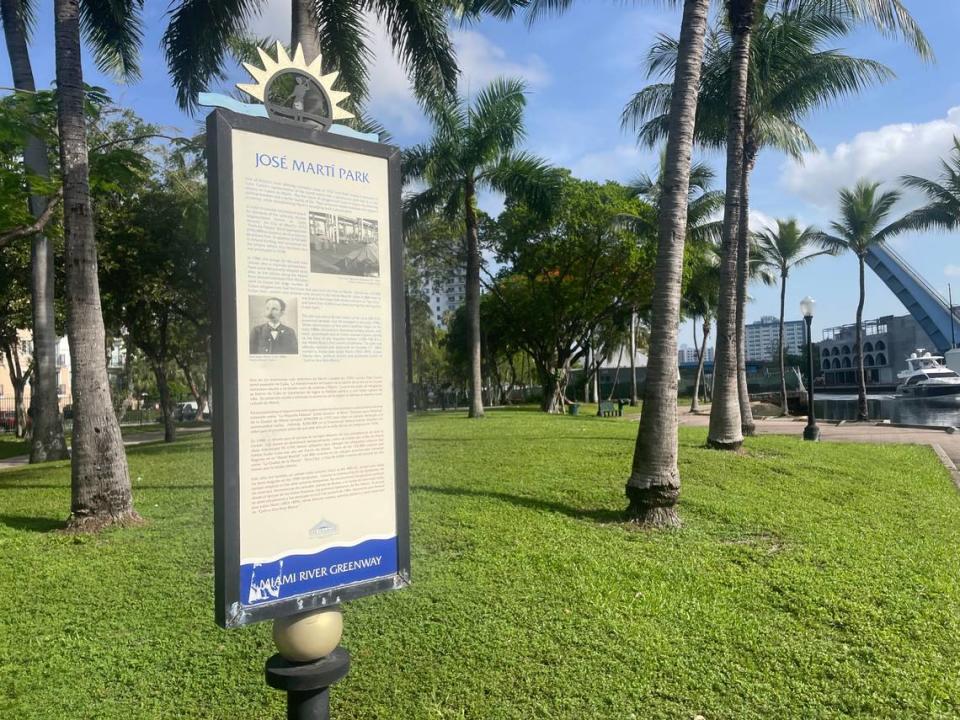Miami is using eminent domain to take a Miami River site. Jury to decide the price
The city of Miami wants to buy a small parcel of land to create a new park on the Miami riverfront without knowing how much it will cost taxpayers.
A proposal to establish a park honoring Venezuelan national hero Simón Bolívar has led to a multi-year legal battle. Soon, a judge is expected decide whether the city can take a piece of land on the south side of the Miami River for the park, a project spearheaded by Commissioner Joe Carollo.
The city previously appraised the property’s value at around $3.5 million, but South River Warehouse, LLC, the development firm led by Arturo Ortega that owns the property, has stated it believes the land is worth around $23 million. And a recent internal email shows the city’s attorneys also anticipate a higher price tag.
Carollo has called for more green space in his district, including this proposed park. Now, the city is attempting to acquire the land through eminent domain, a process that allows the government to buy land for public use, even if the owner does not want to sell it.
“Is there a need for more park land? Absolutely there’s a need,” Carollo said.
Ortega isn’t so sure. He said by the city’s criteria there are already enough parks in the area, adding, “This initiative really doesn’t make sense.”
South River Warehouse has fought to retain the property, a parcel of about a third of an acre between the SW First Street and Flagler Street bridges on SW South River Drive.
The firm rejected the city’s initial offer of nearly $4.5 million to purchase the land in October 2021. After the offer was rejected, the city began eminent domain proceedings, which are ongoing.
“We made them an offer. They did not take it,” said Kenia Fallat, a spokesperson for the city.

Using eminent domain
If the city is awarded the title to the land, a jury will decide the value of the property, which the city will then be required to pay to South River Warehouse.
Ortega said the eminent domain process could leave the city on the hook for more than it planned to spend.
“Getting a deed to a property before establishing a valuation is the equivalent of writing a blank check,” Ortega said. “No one knows how much the jury is going to decide the property’s worth.”
Ortega’s estimation of the property value came from sales of similar properties along the river, though some of those properties are home to buildings and businesses. South River Warehouse’s lot, which is located near José Martí Park, does not have any buildings or structures, but Ortega said he has plans for a restaurant and water taxi stop on the lot.
In an internal email sent July 4 and obtained by the Herald, City Attorney Victoria Méndez indicated that valuation may have gone up since the initial appraisal. She stated, “since we started the taking phase for the property, the value may have increased from $3 million to anywhere from a realistic $5 million (to even up to $10 million).”
In the same email, Méndez said, “We are treading cautiously to make sure if we acquire the property, it is still within the district funding.”
Carollo pushing for more park land
Carollo said he does not expect to be saddled with a hefty price tag when the jury determines the value of the property.
Bringing more park space to Little Havana and the Third District in general, Carollo said, is important to him.
“I’m constantly being asked for more parks in my district,” Carollo said. “José Martí Park in itself, that’s not sufficient park land for that district.”
The city has expressed its desire to expand park land in Miami as well. “We have a need for additional park space,” Fallat said.
Carollo said he hopes to connect nearby José Martí Park with Ortega’s nearby lot to create a strip of park land along the Miami River in Little Havana. But that may prove difficult.
The lots between the two parks are controlled by the Florida Department of Transportation, which has said it does not plan to cede the land.
“The Florida Department of Transportation has unequivocally communicated to the parties that they will be keeping their properties, so that park realistically can no longer happen,” Ortega said. “Taking our property, and then not being able to unify the two parks seems like a waste of taxpayers monies.”
Still, Carollo said, if the city cannot acquire the land between the parks, it can connect them using sidewalks or walkways.
South River Warehouse claims the city should not be able to acquire this land because the underwater portion of the property is owned by and leased from the state of Florida, and the city has not followed the proper procedure given the state’s stake. South River Warehouse also alleges the city was not transparent in its appraisal and is not offering full compensation.
Ortega expressed his dismay about what he sees as an attempt by the government to unfairly take his private property. Carollo, though, said he thinks the process has been fair.
“This is not Venezuela, that we’re taking their property,” Carollo said. “And I think that’s important.”

